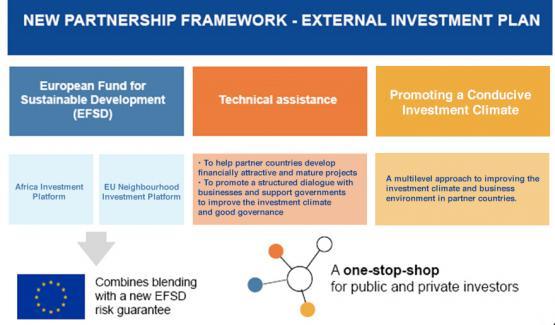
Following the adoption by the European Parliament and the Council, the European Commission immediately starts the implementation of its ambitious External Investment Plan to boost investments in Africa and the EU Neighbourhood.
The European Parliament and the Council have adopted the European Fund for Sustainable Development, the heart piece of the EU's new External Investment Plan (EIP). The EIP will support more inclusive and sustainable development in Africa and the European Neighbourhood. It will boost public and private investment and thus address some of the obstacles to growth in our partner countries and of the root causes of irregular migration.
High Representative/Vice-President Federica Mogherini said: "Less than 10 per cent of Foreign Direct Investment in Africa goes to fragile regions – those that need it the most. We want our External Investment Plan to become a powerful engine of more inclusive and sustainable growth, to create green energy, to bring new opportunities to entrepreneurs, also in the European Union, to young people, to empower women. This is the plan Africa needs, this is what our African partners are asking for, this is European partnership at its best."
Commissioner for International Cooperation and Development Neven Mimica added: "Our External Investment Plan marks a new approach for eradicating poverty and achieving inclusive sustainable development. By leveraging in particular private finance, our contribution of €4.1 billion will leverage up to €44 billion of investments which otherwise would not happen. Now it is up to all key players of the private sector in Europe and in our partner countries to join us in creating sustainable growth and decent jobs for the benefit of all."
Commissioner for European Neighbourhood Policy and Enlargement Negotiations Johannes Hahn said: "Europe is confronted with many challenges at its borders and beyond, challenges that will surely grow in the future, as demographic pressures, mobility and effects of climate change increase and regional conflicts are ongoing. It is in Europe's own interest that we all work to ensure sustainable and balanced economic growth in our partner countries. Involving the private sector and securing the most conducive environment for it to thrive will support these efforts. By triggering sustainable growth in our partner countries around Europe and in Africa, we are also offering new trade and investment opportunities for EU enterprises and investors. "
Moving ahead with the EIP's rapid implementation, the first Strategic Board of the European Fund for Sustainable Development (EFSD) meets today in Brussels. The Strategic Board includes the EU Member States and the European Investment Bank, as well as the European Parliament as observer. They will discuss a series of proposals for concrete areas for investment, the so-called "investment windows". These windows define priority sectors for the EFSD Guarantee, identified as essential for the creation of decent and sustainable jobs in Africa and the EU Neighbourhood.
The first investment windows are expected to be approved shortly, so that the EIP can start to make a real difference for beneficiaries on the ground.
Background
The European Investment Plan (EIP) was proposed by President Juncker in September 2016. Already a year later, the EIP is becoming operational.
In order to foster sustainable development, the EIP will integrate a new generation of financial instruments into more traditional forms of assistance such as grants – namely guarantees, risk sharing instruments, as well as the blending of grants and loans. Substantial technical assistance will help beneficiaries produce more mature and financially viable projects and businesses. The EU will also step up its dialogue with partner countries, as well as a structured private sector dialogue to improve the investment climate and the business environment in the respective partner countries.
The EIP's innovative and holistic approach builds on the Commission's blended finance instruments, bringing together lessons learned over ten years of blending activities.
Further info:
Questions and answers about the European External Investment Plan
Details
- Publication date
- 28 September 2017
- Author
- Directorate-General for Neighbourhood and Enlargement Negotiations
